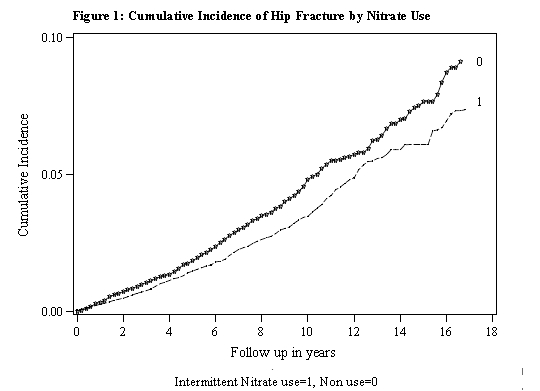Session Information
Session Type: Abstract Submissions (ACR)
Background/Purpose: Nitrates are commonly used anti-anginal medications which have also been found to promote bone formation and decreases bone resorption. Intermittent nitrate use has been associated with increased bone mineral density; however, its effect on fracture risk has been conflicting. Because of potential tachyphylaxis with frequent use and challenge of defining regular vs. intermittent use in an observational study, we conducted a cohort study to examine the relation of incident short-acting nitrate use, a proxy for intermittent use, to the risk of hip fracture among older subjects with ischemic heart disease.
Methods: The Health Improvement Network (THIN) is an electronic medical records database containing anonymized clinical and prescription data entered by general practitioners in the UK. We included participants from THIN followed between 1986-2010 who were ≥ 60 years old with ischemic heart disease, without history of hip fracture prior to prescription of short-acting nitrates, no concomitant long-acting nitrate use, and continuously enrolled in the database for ≥12 months. Intermittent nitrate use was defined by incident nitrate use of short-acting formulations only (Glyceryl Trinitrate sublingual/spray/patch or Isosorbide Dinitrates injection/sprays) using Drug Codes, with ≥2 prescriptions in 1 year. Each intermittent nitrate user was matched by age, sex and enrollment year with a non-user (Never nitrate use). Follow-up started 1 year after the first nitrate prescription. Hip fractures were identified using Read Codes. We plotted Kaplan-Meier survival curves to determine cumulative incidence rate for hip fracture by intermittent nitrate use. Hazard ratios (HR) of incident hip fracture related to intermittent nitrate use was also estimated using Cox proportional hazards regression models, adjusting for BMI, recurrent falls, heart failure, smoking, alcoholism, use of beta-blockers, bisphosphonates, diuretics, estrogens and glucocorticoids.
Results: Included were 14 925 intermittent nitrate users (median # prescriptions in 1 year: 3.0) and 14 925 non-users (mean age 73±7.6, 41% women for each cohort). Hip fracture occurred in 267 intermittent nitrate users and 332 non-users, respectively. Cumulative incidence of hip fracture increased rapidly among non-users compared with intermittent nitrate users (Fig 1). Compared with non-users, rate of hip fracture was 30 % lower and did not change substantially after adjusting for other potential confounders (adjusted HR=0.69, 95% CI 0.55-0.86, p=0.001).
Conclusion: In this large population-based cohort study, we found that intermittent (short-acting) nitrate use was associated with significant reduction in hip fracture risk among older adults with ischemic heart disease. Future studies are warranted, given the potential for nitrates to be inexpensive and readily available anti-osteoporotic agents.
Disclosure:
D. Misra,
None;
C. Peloquin,
None;
H. Choi,
None;
T. Neogi,
None;
Y. Zhang,
None.
« Back to 2012 ACR/ARHP Annual Meeting
ACR Meeting Abstracts - https://acrabstracts.org/abstract/intermittent-nitrate-use-and-risk-of-hip-fracture/

